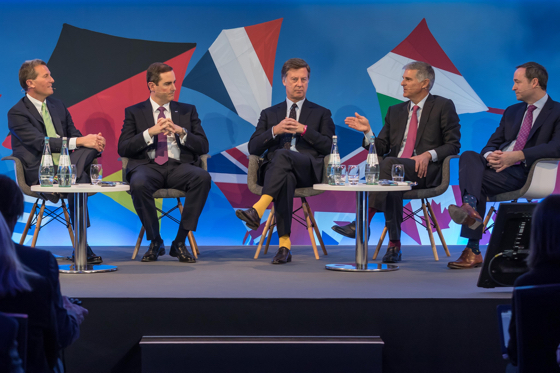Perhaps the overall positive outlook of this year’s International Hotel Investment Forum in Berlin can be summarized by the bright hues of the socks modeled by this year’s line-up at the annual CEO panel.
The sock challenge was leveled by Tuesday morning panel moderator Andreas Scriven, Deloitte’s head of hospitality and leisure, and it was all in good fun. But it was a visual reminder that the challenges facing the panelists, who combined represented about 80 brands: growth, market share and identity – not dreary downturns or dull outlooks.

Much of the conversation centered around brands. “They have way too many brands and we have far too few,” joked Chris Nassetta of his fellow panelists (while wearing burgundy socks, which he borrowed from a colleague after discovering that his orange Canopy lounge socks wouldn’t fit in his shoes). The president and CEO of McLean, Virginia-based Hilton said that his company created five brands in seven years and continue to evaluate where they have gaps in the system that can serve customer needs. The company’s Tru brand “will be the most impactful for us. It has to do with the fact that it was a segment we weren’t serving,” he said.
Paris-based AccorHotels Chairman and CEO Sébastien Bazin (yellow socks) on his own stable: “Brands are like a group of friends. For every occasion you can count on them” – for fun, work, relaxation. Too many brands is not the issue for Bazin, but differentiating among those brands is: Every new brand that is trendy and sexy will be taken over a few years later by another brand. Protecting and growing the brand, not killing it, matters, he said.
One thing they all agreed on: Size does matter, and so does scale, more and more. IHG’s CEO Keith Barr acknowledged that it was difficult to start a luxury brand from scratch. “It makes more sense to find a great small company you can leverage,” he said.
What is Barr doing about it? In addition to launching a conversion brand later this year, U.K.-based IHG plans to acquire a luxury brand that would sit above InterContinental in price point. He refused to name the company but described it as “small with a great customer proposition.”
Geoff Ballotti would agree with the acquisition approach as the Parsippany, New Jersey-based Wyndham Hotel Group’s nearly US$2 billion purchase of La Quinta Holdings is expected to close in the second quarter. To celebrate his dominance in the economy segment, everyone on the panel got a pair of the striped socks he wore. But seriously, “If we’re not growing the top line, we’re not doing our job,” Ballotti said.
Customers and technology
Then there are sobering realities: Home-sharing alternatives continue to become entrenched and OTAs continue to steal market share. “The problem with our industry is we see our customers three to four times a year,” Bazin said. “Facebook sees the customer 12 times a day… If we want to grow and have high valuation, we have to interact better.”
Accor, for its part, continues to explore how to offer customers something that isn’t limited to a hotel room. According to Bazin’s math, the billions of people who live in urban centers are worth attempting to capture as a customer, even if they aren’t one of the 1 billion estimated travelers on the planet. “It’s worth trying,” he said.
Accor’s innovation lab is producing iterations of that theme with its Jo&Joe brand, where guests buy a bed versus a room. A next possible step, Bazin added, is becoming a company that also brings the bed right to the customer.
What Accor is not, Bazin said, is a technology company. Facebook has never met its customers, but it knows them inside and out. “What they cannot do we can do,” Bazin said – see the customer face to face.
Choice Hotels International President and CEO Patrick Pacious doesn’t have a problem calling the Rockville, Maryland, company a technology company. He said the platform provides the capability to give the customer a frictionless experience that allows them to use their time more effectively, and it allows Choice to expand without losing sight of its core business.
Whatever the delivery mechanism, Pacisou said, “It’s Alexa today. Tomorrow it will be some other mechanism… I think your data is your destiny.”
